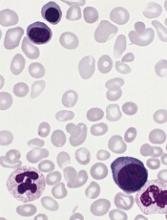The European Medicines Agency’s Committee for Medicinal Products for Human Use (CHMP) has recommended approval for ropeginterferon alfa-2b (BESREMi®) to treat adults who have polycythemia vera (PV) without symptomatic splenomegaly.
Ropeginterferon alfa-2b is a long-acting interferon, which is administered once every 2 weeks or monthly after stabilization of hematological parameters.
The CHMP’s recommendation for ropeginterferon alfa-2b will be reviewed by the European Commission, which has the authority to approve medicines for use in the European Union, Norway, Iceland, and Liechtenstein.
The European Commission usually makes a decision within 67 days of a CHMP recommendation.
The CHMP’s positive opinion of ropeginterferon alfa-2b is supported by data from CONTINUATION-PV (NCT02218047), a phase 3b extension trial of PROUD-PV (NCT01949805).
Results from the PROUD-PV study were presented at the 2016 ASH Annual Meeting. The latest data from CONTINUATION-PV were presented at the 2018 ASH Annual Meeting.
PROUD-PV enrolled 254 PV patients who were treatment-naive or pretreated with hydroxyurea (HU). They were randomized to receive ropeginterferon alfa-2b (n=127) or HU (n=127).
The latest analysis of CONTINUATION-PV included 83 of the patients on ropeginterferon alfa-2b and 70 of the patients who either remained on HU or switched to best available therapy (BAT) as selected by investigators.
At 24 months, the complete hematologic response (CHR) rate was 70.5% with ropeginterferon alfa-2b and 49.3% with HU/BAT (P=0.0101).
At 36 months, the CHR rate was 70.5% with ropeginterferon alfa-2b and 51.4% with HU/BAT (P=0.0122).
A composite endpoint of CHR plus symptom improvement occurred in 52.6% of patients treated with ropeginterferon alfa-2b and 37.8% of patients on HU/BAT (P=0.0437).
Disease- or treatment-related secondary malignancies in patients receiving HU/BAT included two cases of acute myeloid leukemia, one melanoma, and two basaliomas.
There were three malignancies—glioblastoma, seminoma, and adrenal neoplasm—reported in patients treated with ropeginterferon alfa-2b. Investigators said these malignancies were most likely unrelated to treatment.
The rate of adverse events was 89.8% in the ropeginterferon alfa-2b arm and 90.6% in the HU/BAT arm. Treatment-related adverse events occurred in 74.8% and 78.7% of patients, respectively.
Anemia, thrombocytopenia, and leukopenia occurred more frequently with HU/BAT, whereas liver enzyme increase was mainly observed with ropeginterferon alfa-2b.
CONTINUATION-PV was sponsored by AOP Orphan Pharmaceuticals AG in collaboration with PharmaEssentia.


